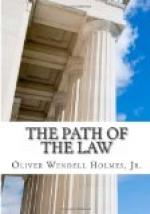Far more fundamental questions still await a better answer than that we do as our fathers have done. What have we better than a blind guess to show that the criminal law in its present form does more good than harm? I do not stop to refer to the effect which it has had in degrading prisoners and in plunging them further into crime, or to the question whether fine and imprisonment do not fall more heavily on a criminal’s wife and children than on himself. I have in mind more far-reaching questions. Does punishment deter? Do we deal with criminals on proper principles? A modern school of Continental criminalists plumes itself on the formula, first suggested, it is said, by Gall, that we must consider the criminal rather than the crime. The formula does not carry us very far, but the inquiries which have been started look toward an answer of my questions based on science for the first time. If the typical criminal is a degenerate, bound to swindle or to murder by as deep seated an organic necessity as that which makes the rattlesnake bite, it is idle to talk of deterring him by the classical method of imprisonment. He must be got rid of; he cannot be improved, or frightened out of his structural reaction. If, on the other hand, crime, like normal human conduct, is mainly a matter of imitation, punishment fairly may be expected to help to keep it out of fashion. The study of criminals has been thought by some well known men of science to sustain the former hypothesis. The statistics of the relative increase of crime in crowded places like large cities, where example has the greatest chance to work, and in less populated parts, where the contagion spreads more slowly, have been used with great force in favor of the latter view. But there is weighty authority for the belief that, however this may be, “not the nature of the crime, but the dangerousness of the criminal, constitutes the only reasonable legal criterion to guide the inevitable social reaction against the criminal.”
The impediments to rational generalization, which I illustrated from the law of larceny, are shown in the other branches of the law, as well as in that of crime. Take the law of tort or civil liability for damages apart from contract and the like. Is there any general theory of such liability, or are the cases in which it exists simply to be enumerated, and to be explained each on its special ground, as is easy to believe from the fact that the right of action for certain well known classes of wrongs like trespass or slander has its special history for each class? I think that the law regards the infliction of temporal damage by a responsible person as actionable, if under the circumstances known to him the danger of his act is manifest according to common experience, or according to his own experience if it is more than common, except in cases where upon special grounds of policy the law refuses to protect the plaintiff or grants a privilege to the defendant. I think




